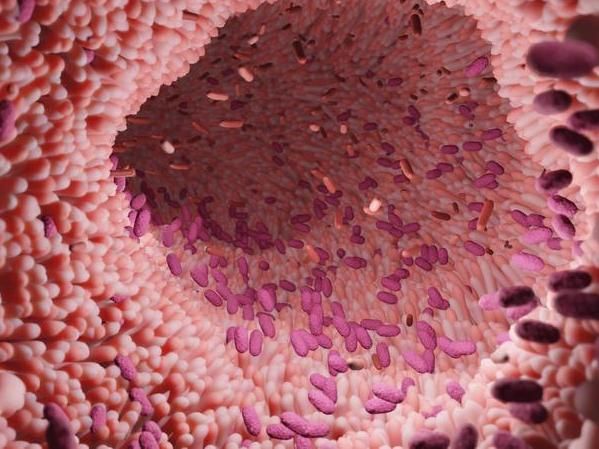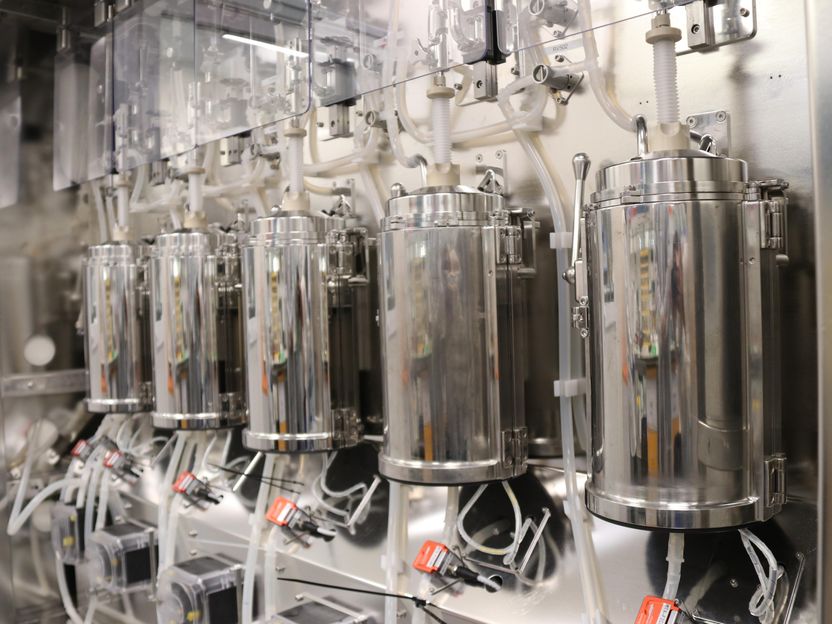A low-calorie diet alters the gut microbiome and delays immune aging
A calorie-reduced diet can not only delay the development of metabolic diseases, but also has a positive effect on the immune system. Researchers have now shown for the first time that this effect is mediated by an altered gut microbiome*, which slows down the deterioration of the immune system in old age (immune senescence). The study has been published in Microbiome.

Gut with Firmicutes and Bacteroidetes bacteria.
CMFI/Leon Kokkoliadis
Around 2 billion people worldwide are overweight. Obesity increases the risk of developing high blood pressure, heart attack or type 2 diabetes mellitus and can cause inflammation in the body that weakens the immune system through an accumulation of specific memory T and B cells. This process is called immune senescence, an age-related change in the immune system. In obese people, the development of metabolic diseases such as type 2 diabetes can be delayed by a low-calorie diet. In addition, such a diet also has a positive effect on the immune system. But exactly how the positive effects are mediated and what role the gut microbiome plays in this process is not yet known. In a recent study, researchers have now investigated the interactions between calorie-reduced diets, the microbiome, metabolism and the immune system.
Calorie-reduced diet alters the gut microbiome
For this purpose, they first analyzed how a very low-calorie diet (800 kcal/day for 8 weeks) affected the gut microbiome of an obese woman. In the next step, the researchers transplanted the gut microbiota before and after the diet intervention into germ-free mice to establish a gnotobiotic mouse model. "In this way, we were able to determine the sole effects of the diet-shaped gut microbiome on metabolism and the immune system," said Reiner Jumpertz von Schwartzenberg, last author of the study and a scientist at the Institute of Diabetes Research and Metabolic Diseases of Helmholtz Munich at the University of Tübingen, a partner of the German Center for Diabetes Research (DZD). He led the study together with Hans-Dieter Volk and Joachim Spranger of Charité.
Diet-altered gut microbiome improves metabolism and delays immune senescence
By transplanting the diet-altered microbiota, glucose metabolism improved and fat deposition decreased. In addition, mass cytometry showed that the level of specific memory T and B cells was also reduced. "This indicates delayed immune senescence," said Julia Sbierski-Kind, first author of the study.
"These findings suggest that the positive effects of a low-calorie diet on metabolism and the immune system are mediated via the gut microbiome," Sbierski-Kind said. However, the authors of the study emphasize that the investigation has so far only been conducted with the microbiome of one person and that the experiments will have to be repeated with additional subjects to confirm the results. The new findings could also be interesting for medical practice in the long term. "An improved understanding of the complex interplay between diet, the microbiome and the immune system may set the stage for the development of new microbiome-based therapeutic avenues to treat metabolic and immune diseases," said Jumpertz von Schwartzenberg.
*Gut microbiome: The gut microbiome is the term used to describe the totality of all microorganisms and intestinal bacteria in our digestive tract. Among other things, it influences the immune system and the metabolism of its host.
Original publication
Other news from the department science

Get the food & beverage industry in your inbox
By submitting this form you agree that LUMITOS AG will send you the newsletter(s) selected above by email. Your data will not be passed on to third parties. Your data will be stored and processed in accordance with our data protection regulations. LUMITOS may contact you by email for the purpose of advertising or market and opinion surveys. You can revoke your consent at any time without giving reasons to LUMITOS AG, Ernst-Augustin-Str. 2, 12489 Berlin, Germany or by e-mail at revoke@lumitos.com with effect for the future. In addition, each email contains a link to unsubscribe from the corresponding newsletter.
Most read news
More news from our other portals
Last viewed contents

By growing animal cells in rice grains, scientists dish up hybrid food - Beef, but make it rice: Scientists create affordable and sustainable protein alternative

Pioneering digital watermarks for smart packaging recycling in the EU - AIM, the European Brands Association, launches cross-value chain initiative to drive circular economy goals

Ever After Foods Debuts Disruptive Cultivated Meat Production Platform - Eliminates Barriers Faced by Current Cultivated Meat Approaches That Rely on Enormous Bioreactors Infeasible for Scalable Animal Cell Cultivation




























































